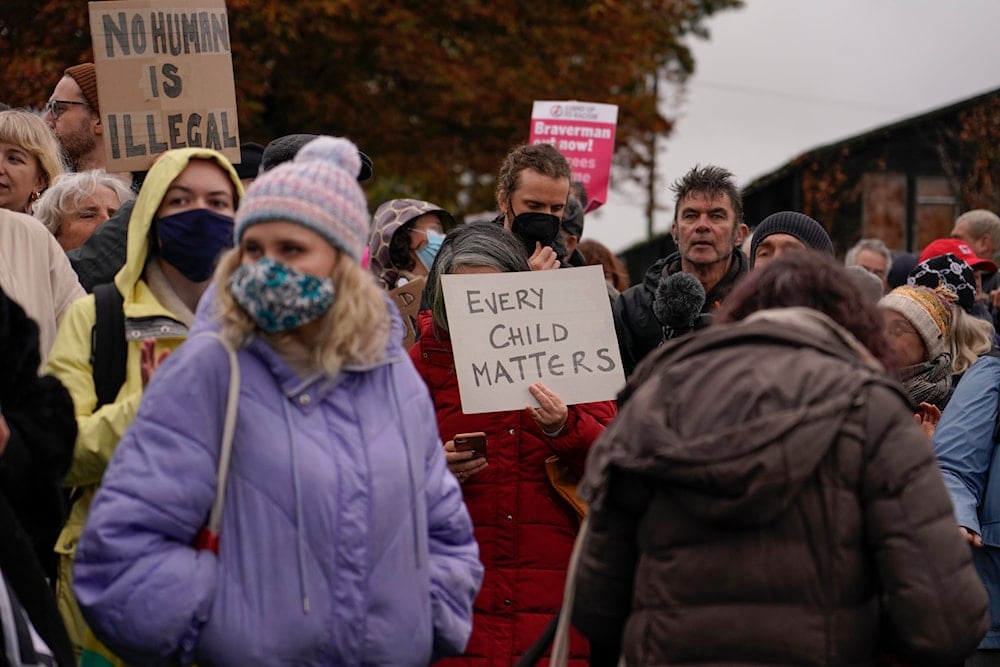UK’s strict immigration rules may trap modern slavery victims
The UK’s crackdown on illegal migration is leaving thousands of modern slavery victims without support, as stricter immigration rules introduced in 2023 have significantly weakened protections.
-

Demonstrators hold placards as they take part in a protest outside the Manston immigration short-term holding facility near Thanet, Kent, England, Sunday, on Nov. 6, 2022. (AP)
Thousands of modern slavery victims in the UK are being denied support due to stricter immigration laws, Reuters reported, citing sources across government, law enforcement, and charities.
A decade after Britain’s landmark Modern Slavery Act (2015) positioned it as a global leader in combating human trafficking, new policies introduced in 2023 to curb illegal migration have severely weakened protections for victims.
"Modern slavery is not an immigration issue; it's a human rights issue," said Kathy Betteridge, a director at the Salvation Army, which has been supporting victims under a government contract for 14 years.
New regulations require victims to provide stronger proof of exploitation to access state support. As a result, rejection rates for slavery claims surged from 11% in 2022 to 45% in 2023 and remained at 46% in the first nine months of 2024, according to official data. In 2023, the Home Office identified approximately 17,000 potential victims, with another 13,587 in the first nine months of 2024. Many of these individuals were migrants exploited in forced labor, sex work, and illegal drug operations.
Despite these numbers, a House of Lords report in October estimated there are around 130,000 victims of modern slavery in Britain, warning that the UK has lost its status as a global leader in combating human trafficking. The report urged the government to amend its immigration policies.
The Labour government, which took office in July, has yet to reverse the policies. Last week, Prime Minister Keir Starmer’s administration upheld a Conservative-era ban preventing asylum seekers from claiming modern slavery protections—despite Starmer previously stating the policy "drove a coach and horses" through safeguards for trafficked women.
A Home Office spokesperson said the government is working to clear backlogs for slavery support claims while also toughening measures against criminal gangs. "It is unacceptable in today's Britain that thousands of vulnerable people—mostly women and children—are being forced to work against their will, often while facing regular physical and sexual abuse," the spokesperson said.
No evidence of systemic abuse
The National Referral Mechanism (NRM), the UK’s system for identifying and supporting trafficking victims, was strengthened by the Modern Slavery Act but has since become harder for victims to access. Conservative governments argued that illegal migrants were abusing the system to avoid deportation, but they have failed to provide evidence of widespread misuse.
Former House of Lords committee member Elizabeth Butler-Sloss, a retired judge, said previous governments were "frantic" about immigration and tightened the rules without proof of fraud. When Laura Farris, then Victims and Safeguarding Minister, was asked in May whether the government had concrete evidence of abuse, she admitted, "Well, no. We do not."
In 2024, only eight individuals were removed from the NRM for posing as victims. In 2023, the number was zero—contradicting claims of widespread fraud.
Foreign victims face harsher treatment
Analysis from the International Organization for Migration (IOM) suggests that since the stricter rules took effect, foreign applicants have faced greater challenges securing support. In 2023-24, 85% of British nationals received positive first-stage NRM decisions, compared to just 44% of foreign applicants—a stark contrast from previous years.
Additionally, around 68% of appeals for rejected applications were successful, raising concerns about poor initial decision-making.
A hidden crime and a chilling effect
A former director of the Gangmasters and Labour Abuse Authority (GLAA), the UK’s agency for tackling labor exploitation, revealed that frontline officers sometimes hesitate to refer suspected victims to the NRM due to tightened rules. "Even when our gut instinct tells us they’re victims, we sometimes don’t refer them," the ex-director admitted.
Britain's Independent Anti-Slavery Commissioner Eleanor Lyons argued that the NRM does not offer enough benefits to justify widespread fraud and warned that broader anti-migration policies—such as the former Rwanda deportation plan—have deterred victims from coming forward.
"We spoke to a victim. They thought that if they came forward and reported their exploitation, that that would automatically mean they were being sent to Rwanda," Lyons said.
With over 20,000 people still awaiting a final decision on their cases, critics warn that Britain’s tougher immigration stance is not just failing victims of modern slavery—it is actively trapping them in exploitation.

 4 Min Read
4 Min Read








